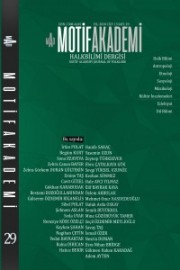SOMUT OLMAYAN KÜLTÜREL MİRAS UNSURLARINDAN YÖRESEL YİYECEKLER: KINALI EKMEK
LOCAL FOOD FROM INTANGIBLE CULTURAL HERITAGE ELEMENTS: “HENNEAD BREAD”
Author(s): Begüm KurtSubject(s): Museology & Heritage Studies, Customs / Folklore, Sociology of Culture
Published by: Motif Halk Oyunları Eğitim ve Öğretim Vakfı
Keywords: Intangible cultural heritage; Turkish folk cuisine; local food; hennead bread; Polat town;
Summary/Abstract: Nations acquire a place for themselves with their unique lifestyles, practices they carry from past to present, and material and spiritual values, making a difference on a universal scale. While cultural elements make progress and progress over time, they are repeated in stability with the importance given to the need and survival of their existence, maintaining their basic qualities and maintaining their essence in New sheaths, thus enabling societies to form a distinctive structure. Today, every value of national culture becomes more important and responsibilities appear in the context of the transport and transfer of folk culture. In this context, among the sources of intangible cultural elements that need to be transferred with their wealth are folk cuisine. Turkish cuisine, which is among the most important cuisines of the world, exhibits a rich part of the national culture. Turkish culinary culture, based on migratory culture and expanding its sources of existence through geography, living conditions and cultural changes in chronological life lines, consists of many components. It includes differences by region as part of national heritage. The evaluation of the local varieties of traditional foods will benefit Turkish folk cuisine by drawing attention to the existence of all differences in this context. For this purpose, traditional foods evaluated within the scope of intangible cultural heritage knowledge and applications related to nature and the universe were examined on the sample of kınalı bread, the local food of Polat town of Doğanşehir District of Malatya province, and the folkloric value of local foods was emphasized with the data obtained from written and oral sources. Thus, it is aimed to reflect the richness of Turkish cuisine, which is a cultural asset area, and to demonstrate its strength in different areas through examples.
Journal: Motif Akademi Halkbilimi Dergisi
- Issue Year: 13/2020
- Issue No: 29
- Page Range: 20-32
- Page Count: 13
- Language: Turkish

